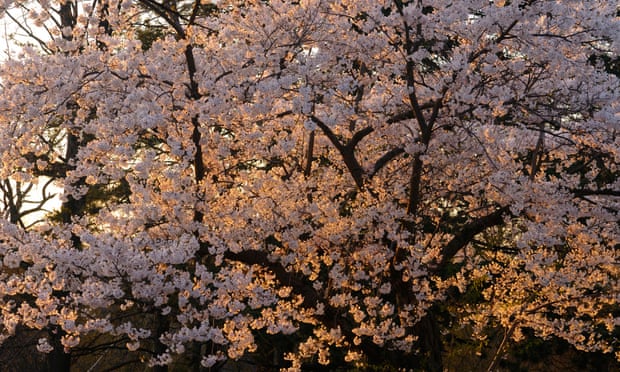A flirtatious fourth-century confession of a young woman’s passion is vivid, sharp and sensual

At the time when blossoms
Fall from the cherry-tree:
On a day when yellow birds
Hovered in the branches -
You said you must stop,
Because your horse was tired:
I said I must go,
Because my silkworms were hungry.
All night I could not sleep
Because of the moonlight on my bed.
I kept on hearing a voice calling:
Out of Nowhere, Nothing answered “yes”.
I will carry my coat and not put on my belt;
With unpainted eyebrows I will stand at the front window.
My tiresome petticoat keeps on flapping about;
If it opens a little, I shall blame the spring wind.
I heard my love was going to Yang-chou
And went with him as far as Ch’u-shan.
For a moment when you held me fast in your outstretched arms
I thought the river stood still and did not flow.
I have brought my pillow and am lying at the northern window,
So come to me and play with me awhile.
With so much quarrelling and so few kisses
How long do you think our love can last?
This week’s poem is the first of a group that appears in Arthur Waley’s 170 Chinese Poems entitled Five “Tzŭ-Yeh” Songs. But we don’t know with any certainty that Tzŭ-Yeh was the author!
Lady Night, aka Lady Midnight, Tzŭ-Yeh was said to have been a Chin Dynasty poet from Jiangnan, who worked as a courtesan or a “sing-song” girl. But the many poems attributed to her may have been written by various hands, one or none of them hers. Whatever the authorship, a new genre, Midnight Songs Poetry, was established towards the end of the fourth century, and remained influential for many years to come.
The intimate tone and vivid natural imagery of the Songs recall Ezra Pound’s version of the poem by Rihaku/Li-Po, The River-Merchant’s Wife: A Letter, published in Cathay in 1915. Li-Po himself must have been influenced by the “Tzŭ-Yeh” songs.
More
Fall from the cherry-tree:
On a day when yellow birds
Hovered in the branches -
You said you must stop,
Because your horse was tired:
I said I must go,
Because my silkworms were hungry.
All night I could not sleep
Because of the moonlight on my bed.
I kept on hearing a voice calling:
Out of Nowhere, Nothing answered “yes”.
I will carry my coat and not put on my belt;
With unpainted eyebrows I will stand at the front window.
My tiresome petticoat keeps on flapping about;
If it opens a little, I shall blame the spring wind.
I heard my love was going to Yang-chou
And went with him as far as Ch’u-shan.
For a moment when you held me fast in your outstretched arms
I thought the river stood still and did not flow.
I have brought my pillow and am lying at the northern window,
So come to me and play with me awhile.
With so much quarrelling and so few kisses
How long do you think our love can last?
This week’s poem is the first of a group that appears in Arthur Waley’s 170 Chinese Poems entitled Five “Tzŭ-Yeh” Songs. But we don’t know with any certainty that Tzŭ-Yeh was the author!
Lady Night, aka Lady Midnight, Tzŭ-Yeh was said to have been a Chin Dynasty poet from Jiangnan, who worked as a courtesan or a “sing-song” girl. But the many poems attributed to her may have been written by various hands, one or none of them hers. Whatever the authorship, a new genre, Midnight Songs Poetry, was established towards the end of the fourth century, and remained influential for many years to come.
The intimate tone and vivid natural imagery of the Songs recall Ezra Pound’s version of the poem by Rihaku/Li-Po, The River-Merchant’s Wife: A Letter, published in Cathay in 1915. Li-Po himself must have been influenced by the “Tzŭ-Yeh” songs.
More
No comments:
Post a Comment